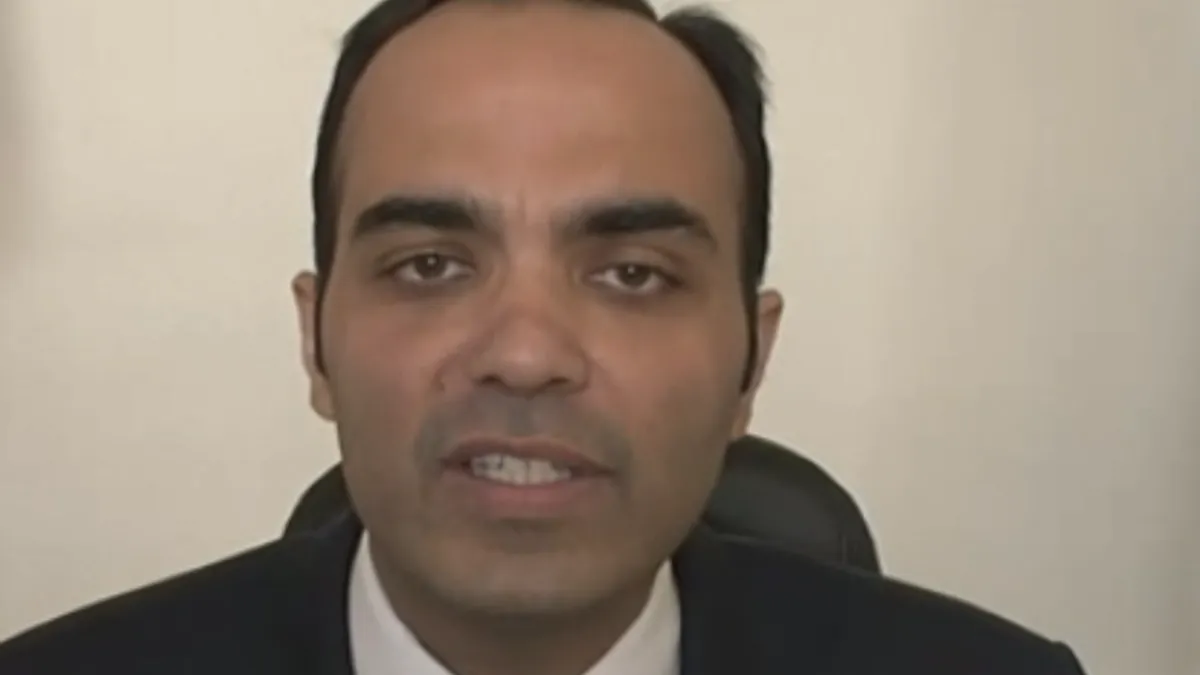Dive Brief:
- The Senate confirmed Rohit Chopra on Thursday, by a 50-48 party-line vote, to lead the Consumer Financial Protection Bureau (CFPB).
- With Chopra’s ascent to the bureau’s top role, lawmakers and analysts expect the regulator to assume a tougher stance on enforcement. During his March confirmation hearing, Chopra vowed stiffer penalties against entities found to commit fraud or misconduct. He also said he'd bring greater focus to fair lending, including investigating potential discrimination by credit decision-making algorithms.
- The move marks a return to the CFPB for Chopra, who helped develop the regulator from its 2010 inception, alongside now-Sen. Elizabeth Warren, D-MA. He worked as the regulator’s first student-loan ombudsman until 2015. Chopra has served since 2018 as a commissioner with the Federal Trade Commission (FTC), where he regularly pushed the panel to take bolder action to curb “endless scandals involving large technology firms."
Dive Insight:
The CFPB, historically, has shifted in stringency to mirror the dominant political party at the time. It collected $12 billion in consumer redress during the five years Richard Cordray directed the bureau during the Obama administration, according to Bloomberg Law. By contrast, it took in about $1.5 billion between December 2018 and January 2021, under Trump-era appointee Kathy Kraninger.
“The CFPB is a young agency, and you see it whipsawing based on the leadership,” Ashley Taylor, a partner at Troutman Pepper who specializes in consumer finance regulation and enforcement, told The New York Times. “The person at the top makes a huge difference.”
Since February, that person has been Acting Director Dave Uejio, who has laid the groundwork for more structured enforcement. The CFPB last month proposed that small-business lenders be required to collect and report more data on applicants — including the race, ethnicity and sex of borrowers, amount sought, amount approved and reasons for denial. The CFPB also announced the launch of a web portal meant to let entrepreneurs share their experiences about applying for credit.
Under Uejio, the bureau has also reversed at least a pair of Trump-era initiatives, resuming Military Lending Act exams and rescinding a policy statement limiting collection of civil penalties and disgorgement for abusive acts or practices.
One trade group — the Consumer Bankers Association (CBA) — called out the CFPB over its recent reversals.
“Under Director Chopra’s leadership, the Bureau should strive for financial regulations that last longer than a power shift in Washington,” CBA President Richard Hunt said in a statement Thursday. “Constant changes in leadership can cause considerable uncertainty for consumers, small businesses, and financial institutions when rules are repealed and rescinded between directors.”
Priorities
Leadership — be it Chopra, Uejio or President Joe Biden himself (the Supreme Court, after all, ruled that the CFPB director is an at-will employee) — has pinpointed several advocacy avenues for the bureau to pursue.
Biden has asked the CFPB to work on “open banking” rules that could make it easier for consumers to access their banking data and transfer it to other institutions, including fintechs.
Chopra, for his part, struck a pro-competition tone during his confirmation hearing in March.
"I don't want to see a banking system or a financial services system where new market entrants cannot compete and win the day," he said. "Dominant players should not be able to squelch out competition, and that's something we need to always be mindful of."
Some analysts also expect Chopra to scrutinize the rapid growth of “buy now, pay later” platforms, whose users often skew younger and less affluent.
Uejio, during his time, called out companies that have been slow to address consumer complaints — and said consumer advocates have found disparities in some companies' responses to concerns raised by Black, Brown and indigenous people. That push for financial inclusion, a Biden administration priority, is expected to continue under Chopra.
Chopra’s confirmation was fraught with political hurdles. Because the Senate Banking Committee deadlocked 12-12 on Chopra’s nomination in March — again, along party lines — Vice President Kamala Harris cast a tie-breaking vote Thursday to advance Chopra to a final vote.
And in July, the CFPB issued guidance to generally prohibit mortgage companies from foreclosing without contacting the homeowners first to see if they qualify for a lower interest rate or other loan alteration.
Mortgage reform dovetails with comments Chopra made during his March hearing. "We must not forget that the financial lives of millions of Americans lay in ruin," he said. "Many have seen their jobs disappear and will not be able to easily resume their [rent and mortgage] payments.”
Polarization
Lawmakers’ statements Thursday regarding the CFPB’s direction were as polarized as the votes they cast.
“The CFPB will have a leader who is ready to stand up to the biggest banks and the most powerful corporations to protect families, service members, students and the elderly,” said Senate Banking Committee Chair Sherrod Brown, D-OH.
In prepared remarks ahead of Thursday’s vote, Sen. Pat Toomey, R-PA, the committee’s ranking member, said he has “grave concerns that [Chopra] would return the CFPB to the lawless, overreaching, highly politicized agency it was during the Obama administration.”
“At the FTC, … he’s continued to take a ‘shoot first, aim later’ approach to the facts in order to advance his agenda,” Toomey said. “During his CFPB nomination process, Commissioner Chopra has done little to alleviate those concerns.”
Chopra’s confirmation was held up for months — presumably because the Biden administration did not want to lose a Democratic majority on the FTC. To that end, Biden nominated Alvaro Bedoya, a Georgetown University professor, to succeed Chopra on the FTC last month.
Thursday’s confirmation, however, may effectively put companies under the CFPB’s purview on notice.
“The industry didn’t have to dedicate any mindshare whatsoever to the CFPB’s activities for nearly four years,” Isaac Boltansky, a policy analyst at Compass Point Research & Trading, told Bloomberg. “But with Chopra taking the chair, the bureau suddenly jumps up to the top of the worry list for most consumer finance companies.”














